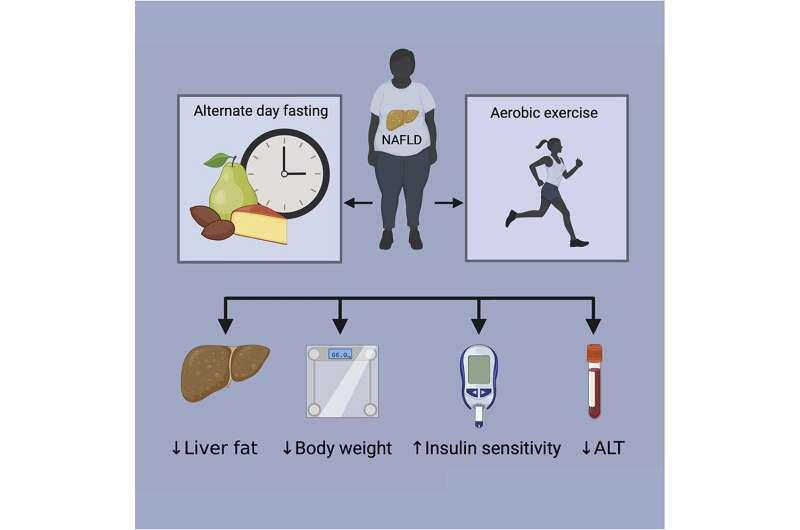Combining alternate-day fasting and exercise can improve the health of people with nonalcoholic fatty liver disease, according to researchers from the University of Illinois Chicago.
The trial aimed to find ways to combat nonalcoholic fatty liver disease that didn’t involve taking pills. Researchers wrote in the paper that, ‘non-pharmacological lifestyle strategies to treat non-alcoholic fatty liver disease (NAFLD) are critically needed’.
Eighty participants took part in a three-month clinical trial. Those who alternated feast and fast days and exercised for five days a week saw significant improvements in their health indicators, according to the study published in Cell Metabolism.
On the fast day participants had to stick to 500 calories. On their non-fasting day they could eat without any restrictions.

Health benefits included increased insulin sensitivity, decreased liver fat, weight loss, and decreased markers for liver disease called ALT (alanine transaminase enzymes).
Study author Krista Varady said that the results are “pretty amazing.”
“When we compared the results of our study groups, we saw clearly that the most improved patients were in the group that followed the alternate-day fasting diet and exercised five days a week,” Varady, who is professor of nutrition at the College of Applied Health Sciences, said.
“The people who only dieted or only exercised did not see the same improvements, which reinforces the importance of these two relatively inexpensive lifestyle modifications on overall health and on combating chronic diseases like fatty liver disease.”
Prevalence of nonalcoholic fatty liver disease
Nonalcoholic fatty liver disease is a buildup of fat and inflammation in patients who drink little to no alcohol.
It affects around 65% of obese adults, or between 10 to 20% of Americans. The disease is strongly related to the development of insulin resistance and Type 2 diabetes.
Sticking to the lifestyle changes
As a surprise to Varady, many of the participants stuck with to the fasting and exercise regime. According to the professor, there is usually a high drop out rate as people find it hard to adhere to the regime.
“Alternate-day fasting and exercise interventions can be difficult for people to stick to and in prior studies we have seen significant dropout. It was very interesting to see that in this trial we had very high adherence to the interventions,” said Varady. who thought the study’s implementation at the beginning of the COVID-19 pandemic in 2020 could be a plausible explanation for the variation.
For more positive health news, why not read this article: Precision Treatment For Dementia Reverses Brain Decline In 80 Percent of Patients

